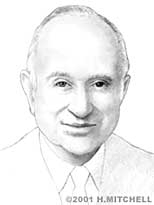CAMBRIDGE, Mass.--The Gordon Foundation has announced its intention to make a gift of $20 million to the MIT School of Engineering to launch a major program to prepare students for engineering leadership. The donation would represent the largest gift to the School of Engineering for curriculum development.
The Bernard M. Gordon-MIT Engineering Leadership Program will be a national model for the development of next-generation technical leaders. It includes three main initiatives: a progressive set of enhancements to MIT's core educational program with a focus on product development and project engineering, an industry mentoring and practice program for students, and an active program to disseminate best practices.
Together, the educational model and future leaders produced by the program will help energize U.S. engineering education and reaffirm MIT's commitment to technical innovation for real-world solutions.
"In view of increasing global competition, we need to reinforce product engineering education--the education of those who innovate and put products into production--for which the United States has a great demand. MIT and its students, as potential leaders, have an obligation to the nation to do this," said Bernard M. Gordon, MIT S.B. 1948 and S.M. 1949.
"Engineering leadership, as reflected by great new inventions, includes not only building on and combining existing elements but also conceiving new elements and systems," said Gordon. "I hope this program will provide additional opportunities for students to develop the practical skills required of 'real' engineers and foster an attitude of appreciation in them for the demands of engineering leadership."
Gordon, a pioneer of analog-to-digital conversion and high-precision medical instrumentation, is the founder of Analogic Corporation and NeuroLogica Corporation. He and his wife, Sophia, established the Gordon Foundation.
Commenting on the gift, Dean of Engineering Thomas L. Magnanti said: "With all the challenges our society faces today, we have a great need for engineering leaders who influence our world and create the new technologies that change it. Building on the School of Engineering's mission and programs to develop such leaders, this magnificent gift allows us to do significantly bigger and better things in this arena.
"We are sending a message to the world about the critical importance of integrating strong fundamentals in engineering with the development of robust practical skills--a combination that can change our very future."
Magnanti thanked two MIT faculty for their key roles in making the new program a reality: Edward Crawley, the Ford Professor of Aeronautics and Astronautics and Engineering Systems, and Joel E. Schindall, the Bernard M. Gordon Professor of the Practice of Product Engineering. (Schindall is one of two MIT professors to hold chairs endowed by Gordon).
Engineering has historically fueled the nation's economic growth and prosperity, and great engineering leaders--those who have conceived exciting new products and led complex technical projects--have had a profound, positive impact on all our lives.
But in recent years, the nation's preeminence in engineering has been challenged. Other nations have been attracting large numbers of young people to engineering, and many say that the United States has lost its capacity and its will to inspire young people to become engineers. Especially troubling has been the perception that we are no longer able to produce great engineering leaders.
MIT's School of Engineering recognizes this challenge and seeks to help students meet it through a variety of hands-on experiences--including industry internships, design-build competitions, and community action projects--but a more integrated program is needed. The Gordon-MIT Program will develop, demonstrate and showcase this integrated vision.
The program's educational component will focus on product development and project engineering. This will include project-based freshman-year subjects in engineering, a sophomore-year introduction to engineering practice, and a number of workshops, internships, and design-implement labs, open to all undergraduate engineers. All will emphasize the skills needed to successfully field new products and systems, such as defining needs, inventing solutions, designing, manufacturing, and testing.
In addition, every year 20 to 30 students will be named Bernard M. Gordon-MIT Engineering Leadership Fellows. These students, selected for their outstanding achievements and demonstrated capacity for engineering leadership, will participate in an industry mentoring and practice program.
A final, explicit goal of the Gordon-MIT Program is to share resulting best practices with other universities. Steps to that end include an annual conference, to be known as the Bernard M. Gordon-MIT Engineering Leadership Conference, as well as workshops, print, and web publications.






